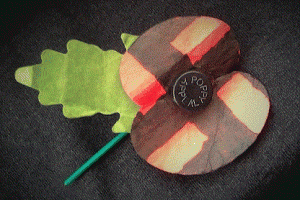Nous sommes donc en guerre les uns contre les autres
We’re all at war with one another
Michel Foucault

The poppy: a symbol of patriotism, exclusion, bygone values, xenophobia, bigotry, volksgemeinschaft (“national community”), war, monarchy, etc. Now more than ever, the youth should promote a global social narrative that recognizes humanity’s common heritage, and abandon the offensively nationalistic customs and celebrations adored by past generations.
Wearing a poppy is far from a celebration of tolerance or civil rights won by Britain and other countries observing Remembrance Day. It does not commemorate the defeat of Nazism, but was created by the British monarchy after World War I to commemorate the pointless waste of lives defending the one man’s personal esteem: the King.
Contrary to its glamorization and acceptance in the British mainstream media, wearing a poppy is more likely to offend many people rather than assure them. Poppies are offensive in modern Britain, because they glorify pointless bloodshed, xenophobia, and the absurdity of “patriotism”. As people become more educated, poppies should be treated as a symbol of stupidity, created by a monarchy that held its soldiers’ lives to be worth about as much as the bits of card used to make these very badges of continued ignorance and cruelty.
Wearing a poppy in public, a person is likely to be seen as a supporter of illegal wars of aggression that the British government engaged in, such as the Iraq War and the recently lost War in Afghanistan. It also shows contempt for the majority of victims of these wars, who were not British soldiers but civilians in Iraq and Afghanistan. Many of these true victims even have family and religious compatriots in our tolerant society, who have suffered and continue to suffer as a result of our country’s war crimes abroad. Are we to consider these members of our society not fully “British”, for sympathizing with the victims instead of invaders and occupiers by not wearing the poppy? If so, the poppy is contrary to social cohesion and cannot coexist with late modernity.
Any member of society who wears a poppy is ignorant or cruel, for failing to acknowledge that occupiers do not deserve compensation but rather the innocent victims of violence are the ones who deserve compensation. Indeed, our country’s arms are open to these victims. Why offend the refugees from our misguided wars even as we pay reparations to them, with the outrageous celebration of our country’s war criminals as “heroes”?
@GeorgeMonbiot @PoppyLegion the poppy should be cast down as a symbol of shame, stupidity and bigotry
— Harry J. Bentham (@hjbentham) November 7, 2014
Remembrance Day and other events revolving around national pride and the armed forces in particular are sponsored by arms contractors, who revel in the blood and gore that they have created. For them, as for the useless Queen, the wreaths of red stand for the blood and guts of the millions of enlisted men and women they misled into an early and entirely unnecessary grave in the First World War.
Some will counter my claims with the old, ill-conceived, argument that wearing the poppy and observing a minute of silence remembers the soldiers who died for my rights to say the things I say. Such an argument is faulty.
First, I didn’t ask anyone to die for me, and if anyone thinks the soldiers who died in Iraq and Afghanistan died for me, they are insane. Even the terrorists who attacked British victims in the famous July 7 attack were themselves born and bred British citizens, so wearing a poppy does little to confront them, as they are part of the very same national community the poppy attempts confusedly to stand for. The reason we are led to this absurdity is that the “nation” lacks cohesion and uniformity – it is at war with itself, and the poppy only confounds this antagonism.
Second, the cruel practice of isolating and excluding non-patriotic elements of society looks more like Nazism to me than anything else I can find in the country. Wearing a poppy certainly does not support human rights and liberal values derived from the defeat of Nazism. Rather, it supports a key tenet of Nazism: the national community, which must exorcise non-patriotic elements from its midst and profess loyalty to banners and slogans that otherwise lack relevance and meaning. Many people in British society do not identify with the United Kingdom, its institutions and its armed forces. The Muslim community largely does not identify with the UK, and the Scottish independence movement’s famed 45% of the people do not. Republicans in Northern Ireland identify even less with the UK.
The poppy, like the flag, is consistent with the Nazi ideal of volksgemeinschaft, “national community” – an integral part of Nazi ideology that led to Nazism’s worst crimes. Using symbolism to mark out enemies of the “nation” and ostracize them, as the poppy seeks to do by polarizing the society between the supporters of the troops and opponents of the troops, is a manifestation of Nazism. At the core, it is proscriptive power like this that allowed the Nazis to argue their ideas about national supremacy that caused the Second World War and justify their mass murders of minorities and “undesirables”. The same hatred is seen today, being cultivated against Muslim minorities by hate groups and hawkish establishment figures in Britain. Even a reaction of intolerance and hate towards a post like mine would be a Nazi-like manifestation, as the Nazis cracked down harshly and intolerantly on anyone who didn’t promote the myths of the nation.
A self-respecting human being should have no part in sanctifying stupidity, observing an offensive custom, or remembering lives sacrificed for lies of a regime and its sense of prestige. Illegitimate wars led by regimes of exclusion and hate should be exposed as obscene, so modern and awakened people can pour their contempt on them, and symbols approving or legitimizing them should be removed from public view.


